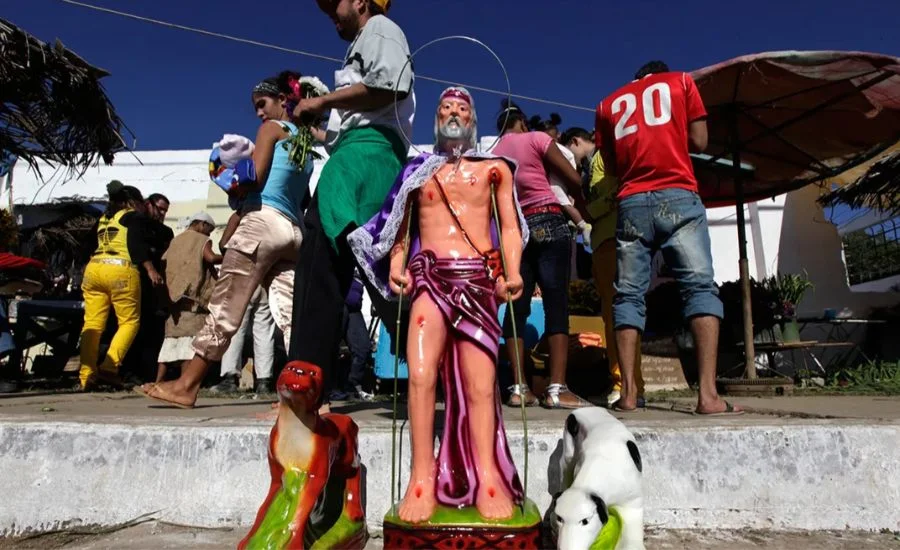St Lazarus Religion Abba Kwi, also known as Abba Kwi, embodies a unique blend of diverse cultural and religious traditions, holding a special place in the hearts of many in Cuba. This spiritual practice revolves around honoring St. Lazarus, a revered figure recognized for his healing powers and his ability to inspire hope among his followers. In times of adversity, Cubans often turn to St. Lazarus as a symbol of resilience and strength.
This blog post delves into the rich tapestry of St Lazarus Religion Abba Kwi, highlighting its synthesis of Christian beliefs and Afro-Cuban customs. We will explore the various rituals that form the core of this faith, recount miraculous stories that showcase the transformative power of belief, and examine the ways in which devotees express their deep reverence for St. Lazarus through diverse practices.
Join us on this enlightening journey to uncover the profound significance of St Lazarus Religion Abba Kwi, a testament to the enduring spirit and faith of the Cuban people. Through this exploration, we aim to gain a deeper understanding of how this religion serves as a source of strength, community, and hope.
The Cultural and Spiritual Significance of St. Lazarus Abba Kwi in Afro-Cuban Traditions
St. Lazarus Abba Kwi, often referred to as Babalu Aye within Afro-Cuban religious practices, holds a prominent position in Santería, an Afro-Cuban faith that intricately weaves together Yoruba traditions and Catholic beliefs. Esteemed as a powerful healer and protector, he is particularly revered by those facing health challenges and diseases. His importance transcends religious boundaries, establishing him as a vital figure in Cuban culture.
In the rich tapestry of Afro-Cuban spirituality, Abba Kwi embodies hope and resilience, serving as a symbol of comfort and strength for many. His influence is evident not only in religious rituals but also in the broader cultural narrative of Cuba, where his legacy inspires faith and communal support among devotees. Understanding the role of St. Lazarus Abba Kwi provides insight into the profound ways in which spirituality and culture intersect in the lives of the Cuban people.
The Rich History of St Lazarus Religion Abba Kwi
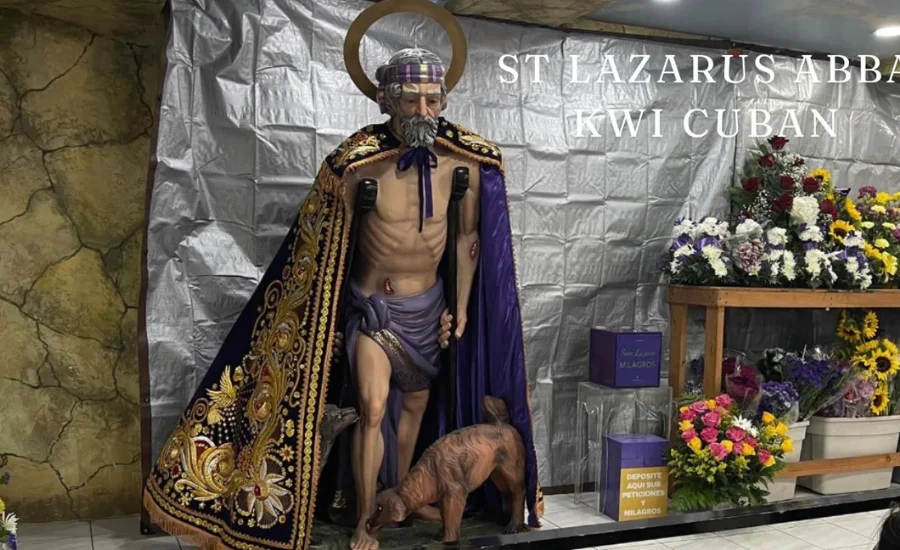
The history of St Lazarus Religion Abba Kwi is a vibrant tapestry woven from biblical narratives and Afro-Cuban spiritual practices. Originating from the biblical accounts of Lazarus, who was miraculously resurrected by Jesus, this figure became a significant emblem within Christianity. Over time, the Cuban populace began to intertwine these biblical stories with African spiritual traditions, resulting in the formation of a distinct religious practice.
As Afro-Cuban beliefs introduced new concepts surrounding healing and spirituality, the worship of St. Lazarus evolved into the veneration of Abba Kwi. In this context, many followers came to perceive him as an orisha, or spirit, capable of offering assistance in matters of health and well-being. This synthesis of cultures illustrates the remarkable adaptability and resilience of faith, showcasing how diverse beliefs can converge to create a profound and meaningful spiritual experience.
The Essence of St Lazarus Religion Abba Kwi
St Lazarus Religion Abba Kwi represents a unique spiritual belief system that harmonizes various cultural traditions, particularly within the Cuban context. For many Cubans, St. Lazarus is revered for his remarkable healing abilities, making him a vital figure of hope and strength in their lives. Abba Kwi embodies resilience, and those who practice this faith engage in rituals that express their devotion and connection to this powerful figure.
In the everyday lives of Cubans, St. Lazarus serves as a symbol of love and compassion. During times of illness or hardship, many turn to him in prayer, seeking his guidance and support. The rich stories and legends surrounding St. Lazarus are cherished and passed down through generations, reinforcing the belief in the transformative power of healing and faith. These narratives not only inspire devotion but also cultivate a sense of community among followers, highlighting the profound impact of spirituality in their lives.
The Reverence for St. Lazarus Abba Kwi in Cuban Culture
St. Lazarus Abba Kwi is widely celebrated throughout Cuba, transcending the religious confines of Santería. His influence is so profound that even individuals who may not identify with any particular faith hold him in high esteem. The significance of this revered figure is highlighted each year on December 17th, known as the Day of St. Lazarus, a date marked by pilgrimages, prayers, and offerings from people of diverse backgrounds.
One of the most notable events associated with St. Lazarus is the pilgrimage to the Church of El Rincón, located near Havana. Every year, thousands of devotees embark on this journey to fulfill vows, express gratitude, and seek blessings from St. Lazarus. Many pilgrims traverse long distances, some even going barefoot or on their knees as acts of penance and devotion.
This pilgrimage serves as a powerful testament to the deep connection between St. Lazarus Abba Kwi and the Cuban people. It embodies a rich blend of faith, tradition, and cultural identity, illustrating how this figure is deeply woven into the fabric of Cuban society. Through these rituals, the enduring spirit of St. Lazarus continues to inspire hope, resilience, and communal solidarity among his followers.
The Healing Legacy of St. Lazarus Abba Kwi in Cuban Culture
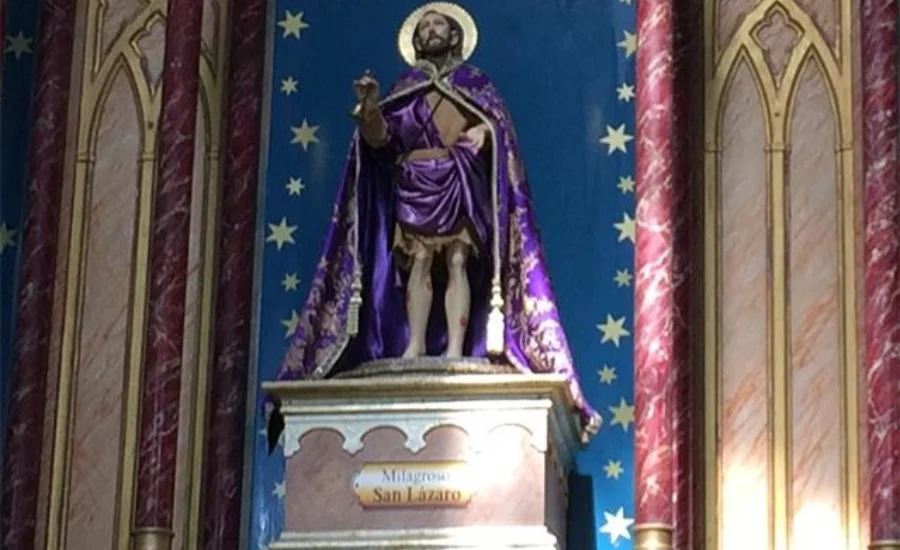
The Cuban reverence for St. Lazarus Abba Kwi is deeply rooted in his biblical narrative, where Jesus miraculously resurrects him from the dead. This story resonates profoundly within the Cuban community, symbolizing the transformative power of faith to overcome adversity. Many Cubans seek solace and support from St. Lazarus, firmly believing in his ability to provide comfort and renewal during challenging times.
One of the most significant expressions of this devotion occurs annually when thousands of followers embark on a pilgrimage to El Rincón, a small town near Havana, to honor St. Lazarus Abba Kwi. This journey serves as a powerful testament to the enduring significance of St. Lazarus in Cuban culture, attracting individuals from diverse backgrounds who seek healing and spiritual fulfillment.
Through this pilgrimage, the profound connection between faith and community is illuminated, as devotees come together to celebrate the legacy of St. Lazarus and the hope he represents in their lives.
The Healing Essence of St Lazarus Religion Abba Kwi
Healing lies at the heart of St Lazarus Religion Abba Kwi, where followers believe in his profound ability to heal both physical and emotional afflictions. Many individuals turn to him for assistance when they or their loved ones face health challenges, finding comfort and hope in their faith.
Community gatherings play a significant role in this belief system, particularly during special events and rituals. These collective prayers for healing showcase the strength of unity and the shared faith among followers. As community members share their personal experiences of healing, they inspire one another to embrace the power of Abba Kwi, reinforcing the vital communal spirit that defines the religion and provides encouragement and strength.
The rituals and practices within St Lazarus Religion Abba Kwi are vibrant and deeply meaningful. One of the most significant events is the annual pilgrimage to El Rincón, where countless devotees travel great distances to pay homage to Abba Kwi. During this journey, expressions of devotion are displayed through acts of penance, such as crawling or carrying heavy crosses, symbolizing their commitment and reverence.
At home, followers continue to honor Abba Kwi through personal rituals. Lighting candles, offering flowers, and preparing special foods serve as daily connections to the divine. These practices foster a sense of intimacy and accessibility within the faith, allowing individuals to express their love and devotion to Abba Kwi in meaningful ways. Through these rituals, followers find a deep sense of purpose and connection, reinforcing the importance of faith in their everyday lives.
The Role of Dogs in St Lazarus Religion Abba Kwi
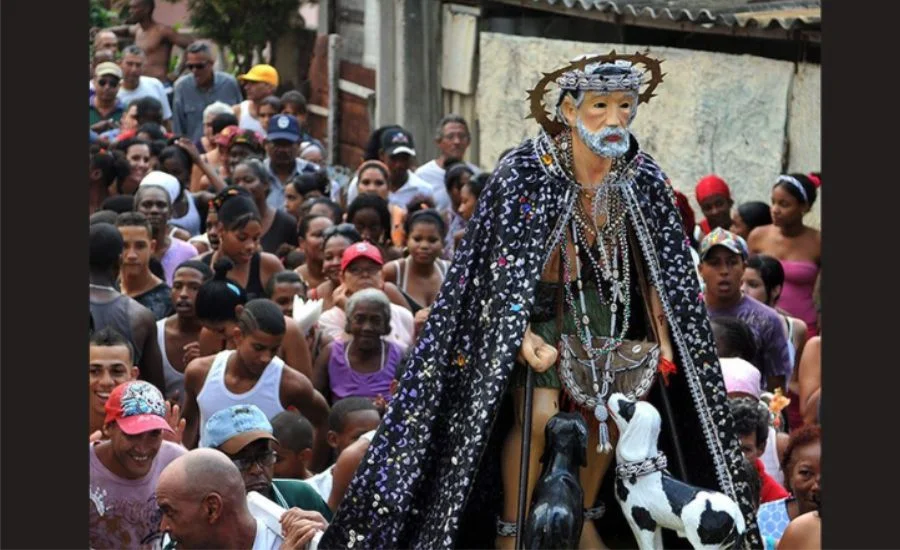
In the St Lazarus Religion Abba Kwi, dogs are revered as powerful symbols of loyalty and companionship. Their steadfast devotion mirrors the faith that followers place in Abba Kwi, serving as a reminder to uphold fidelity in their beliefs. This deep connection emphasizes the importance of loyalty within the faith community.
The stories surrounding St. Lazarus often highlight the compassionate nature of dogs, depicting them as nurturing figures during his times of suffering. Legend has it that they tended to his wounds with their loving licks, showcasing a profound bond between these animals and the figure of Abba Kwi. This relationship enriches the spiritual significance of dogs, enhancing their role within the community.
Many followers view dogs as spiritual guardians, believing that their presence can offer protection from negative energies and harm. This belief integrates dogs into their spiritual practices, making them indispensable companions on their journeys of faith. During rituals and celebrations, dogs are honored guests, with offerings made not only to Abba Kwi but also to these cherished animals. This act of reverence reflects the deep love and respect that followers hold for dogs.
Moreover, dogs are associated with healing within the St. Lazarus Religion. Their comforting presence is believed to provide solace and relief to the sick, making them sources of comfort during challenging times. This connection reinforces the emotional support that dogs offer, further integrating them into the spiritual lives of followers.
The shared affection for dogs fosters a sense of community among believers. Gatherings often include storytelling sessions centered on their beloved pets, creating a bonding experience that strengthens their faith and connection to Abba Kwi. Additionally, dogs hold cultural significance, symbolizing the rich blend of African and Cuban traditions within the faith. Their importance illustrates how diverse cultural elements converge to enhance the worship of Abba Kwi, showcasing the deep-rooted connections between spirituality, community, and the love of animals.
The Cultural Influence of Afro-Cuban Traditions on St. Lazarus Abba Kwi Worship
Afro-Cuban traditions play a pivotal role in shaping the worship of St. Lazarus Abba Kwi, creating a vibrant and dynamic spiritual experience. This unique fusion of African and Caribbean cultures enriches the religious practices, bringing forth a distinct flavor that sets this faith apart. Rituals often incorporate elements from Yoruba beliefs, including herbal healing methods and rhythmic dances, which enhance the spiritual depth and liveliness of the ceremonies.
By weaving these cultural traditions into their worship, followers establish a profound connection with their ancestors, honoring their rich heritage while simultaneously seeking healing and guidance from Abba Kwi. This integration not only reinforces their identity but also cultivates a sense of community among practitioners. The resulting cultural richness transforms the worship experience into one that is deeply personal and collectively meaningful.
In this inclusive environment, individuals are encouraged to express their faith through various forms of worship, allowing for a diverse array of practices that resonate with different personal and communal beliefs. This adaptability not only preserves the integrity of Afro-Cuban traditions but also fosters a supportive space where followers can explore and deepen their spiritual journeys. Ultimately, the amalgamation of these cultural influences enhances the overall experience of faith, making it a living testament to the power of shared beliefs and practices.
The Global Reach of St. Lazarus Abba Kwi Religion
The influence of St Lazarus Religion Abba Kwi transcends the borders of Cuba, capturing the attention of individuals worldwide. This unique faith, which harmoniously merges elements of Christianity with Afro-Cuban traditions, offers a rich cultural tapestry that resonates with many seekers of spiritual understanding. The compelling narrative and practices associated with St. Lazarus Abba Kwi inspire a diverse audience, showcasing the universal power of faith to unite people across different backgrounds.
As awareness of St. Lazarus Abba Kwi grows, so does its community of followers. Enthusiasts share personal testimonies and experiences that illuminate the beauty and significance of this religion, fostering a deeper understanding among those unfamiliar with its traditions. This ongoing dialogue cultivates a spirit of unity and collaboration, allowing individuals from various cultures to learn from one another’s beliefs and practices.
The expanding interest in St Lazarus Religion Abba Kwi signifies a broader movement toward inclusive spirituality, where diverse traditions can coexist and enrich one another. As this faith continues to spread across the globe, its impact will undoubtedly increase, creating new opportunities for connection and shared understanding among people of different faiths and cultures.
The Global Impact of St. Lazarus Abba Kwi
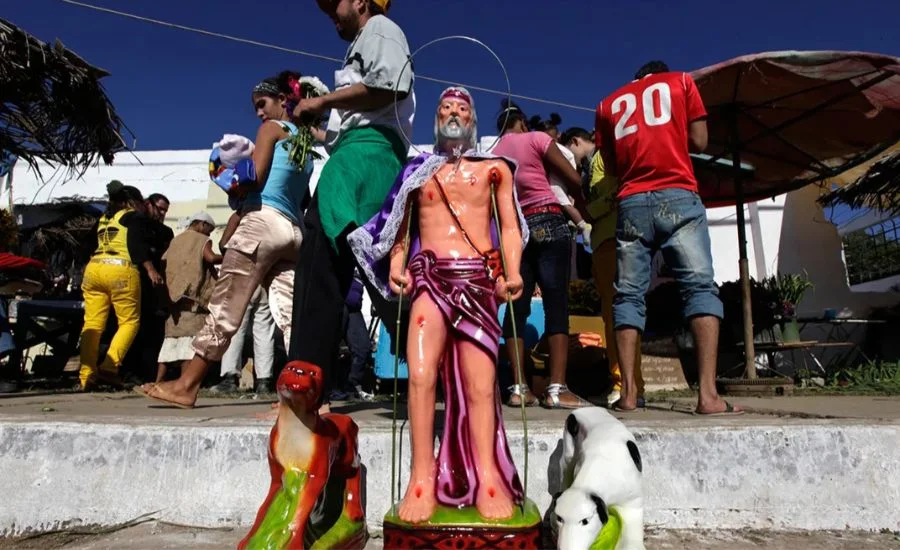
St. Lazarus Abba Kwi is deeply ingrained in Cuban culture, but his influence extends far beyond the island’s shores. The Cuban diaspora, particularly in vibrant communities like Miami, has carried this rich tradition to various corners of the globe. In these areas, St. Lazarus is revered with the same passion and devotion as in Cuba, reflecting his enduring significance in the hearts of his followers.
In cities such as Miami, where the Cuban population thrives, the presence of St. Lazarus is vividly evident. Local celebrations, rituals, and community events dedicated to him are abundant, showcasing a blend of devotion and cultural heritage. These practices illustrate the powerful connection that many Cubans, both at home and abroad, maintain with St. Lazarus. His messages of hope, healing, and protection transcend geographical boundaries, resonating deeply with individuals regardless of their location.
The worldwide proliferation of devotion to St. Lazarus Abba Kwi underscores his universal appeal and the profound impact he has on his devotees. This phenomenon highlights how cultural and spiritual practices can retain their relevance and significance, even as communities migrate and adapt to new environments. The ongoing reverence for St. Lazarus not only bridges the gap between past and present but also connects diverse communities through shared beliefs and values, fostering a sense of unity in a multicultural landscape.
You may also like: Shy College Coed Needs Money
Final Words
St Lazarus Religion Abba Kwi significance transcends cultural boundaries, serving as a powerful symbol of hope, healing, and community. His teachings and the vibrant traditions surrounding his worship not only enrich the lives of his followers but also foster unity among diverse cultures. As the global community continues to embrace his message, the legacy of St. Lazarus endures, offering comfort and strength to individuals from all walks of life. By celebrating his life and teachings, we honor the profound connection between faith and humanity, reminding us of the resilience of the human spirit in the face of adversity.
For more updates and information join us on Gravity Internet Net.

